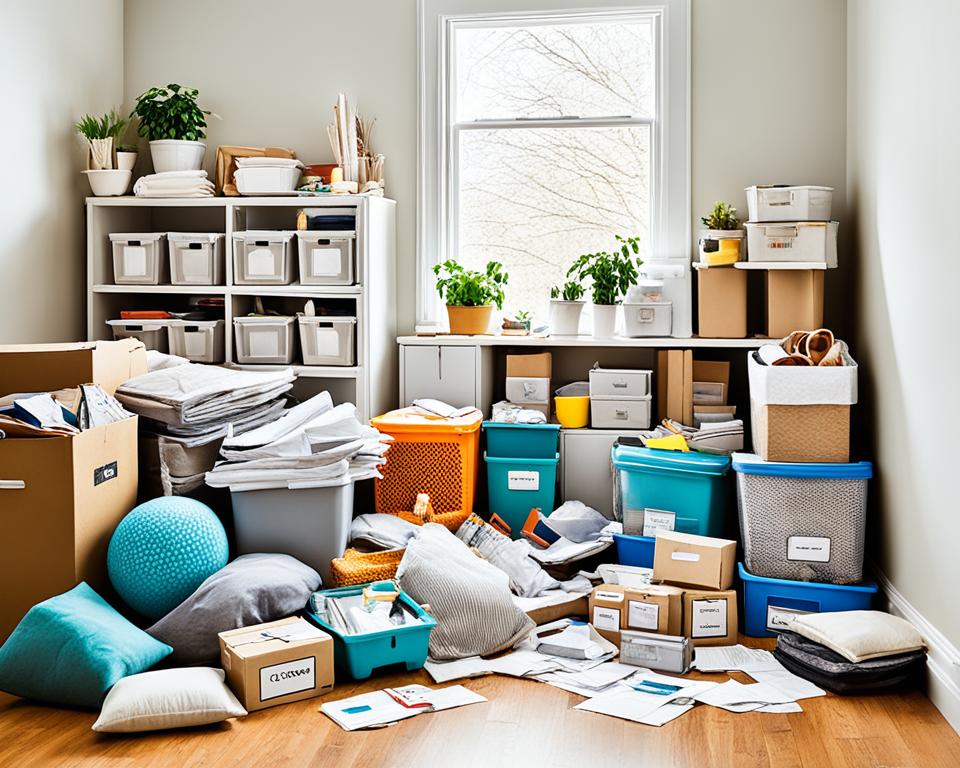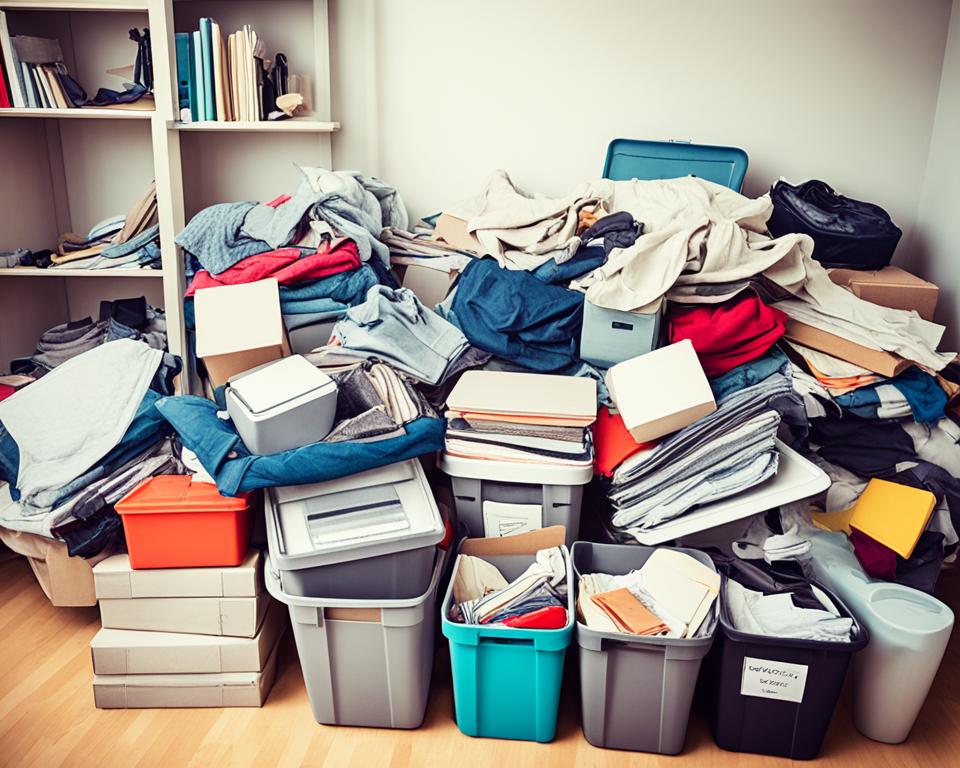If you’re feeling hemmed in by your possessions, it’s high time to declutter your home. Embracing minimalist living isn’t just about having less; it’s about making room for more of what matters. Whether your cupboards are bursting at the seams or your surfaces are littered with seldom-used gadgets, simplifying your life is within reach. Clearing the clutter can be a cathartic endeavour, transforming your living space into an oasis of calm and order. It invites a clutter-free life, opening doors to home organisation like never before.
So, where do you start? Begin with a thorough evaluation of your belongings, guided by a decluttering checklist. With each item, consider its necessity and joy-sparked status. Items of value that have gathered dust could be sold, potentially topping up your savings. Pieces that no longer serve you but could benefit others ought to be donated, as giving promotes both space and goodwill. Then there’s the rest—those things you can’t sell or donate. Approach their disposal responsibly, remembering that sustainability is key. And for those treasures you can’t bear to part with, storage is a thoughtfully strategic choice, keeping them out of sight yet close at hand.
Contact us for advice on how best to store your mementos, ensuring they’re preserved without cluttering your living space. Dial 04 260 2138 or send an email to [email protected], and let us help you make the most out of your newly reclaimed space.
Key Takeaways
- Assess and categorise items during decluttering for a systematic approach.
- Sell items of value to make profit while freeing up space.
- Donate functioning and presentable goods to support charitable causes.
- Discard items responsibly, with an eye towards environmental sustainability.
- Consider storage for items that are infrequently used but still treasured.
- Adopting minimalist living elevates the quality of your homelife and wellbeing.
Identifying Items to Keep, Sell or Donate
Embarking on the journey to declutter and organise your space is a rewarding endeavour. To begin this expedition, you must shift through your collection of belongings with a discerning eye, categorising them for better space management. In this section, discover decluttering tips to identify which of your possessions can transform from valuable clutter into sell-worthy items or generous donations.
Recognising Valuable Items Worth Selling
As you sift through your belongings, set aside those items that you’ve not utilised in over a year and are unlikely to use again. These are prime candidates to transition into sell-worthy items. Popular platforms such as Trade Me or Facebook Marketplace offer the perfect opportunity to give your precious but unused items a new lease on life, all while adding a little extra to your wallet.
Understanding the Emotional and Practical Value of Objects
Keep what you love, use what you need, and store the rest. This principle underpins effective home organisation. Evaluate each item’s frequency of use; if it’s pivotal every quarter, it should remain within reach. However, consider storing infrequent but essential items in offsite storage units. Organising space wisely allows you to cherish the emotional value of objects without crowding your daily living area.
Benefits of Donating and How It Helps Others
Donating clutter not only frees up your space, but also plays a vital role in supporting your community. High-quality items no longer necessary for your lifestyle could greatly benefit local charities, schools, or community centres. It’s important to contact these organisations in advance to understand their criteria for accepting donations, ensuring your contributions can be utilised and appreciated.
| Action | Item Type | Outcome |
|---|---|---|
| Sell | Unused gadgets, designer clothes, antiques | Financial gain, less clutter |
| Donate | Books, clothes, toys | Community support, personal satisfaction |
| Keep | Essentials, sentimentally valuable, frequently used | Functional living space, emotional well-being |
| Store | Seasonal items, infrequent necessities | Preserved items, decluttered home |
In summary, as you decide whether to keep, sell, or donate items, remember the impact of each choice. Selling transforms your valuable clutter into profit, donating supports those in need while decluttering your home, and keeping items judiciously contributes to an efficiently organised space. Let’s embrace the dual benefit of a tidy home and a generous spirit.
Time to Declutter: Sorting Through Your Belongings
Embarking on a journey to a clutter-free life begins with a thorough audit of your possessions. Decluttering checklist is not just an itemised itinerary, it’s a blueprint for minimalist living. Yet, the task of categorising each item into keep, store, sell, donate, or discard can feel daunting. Start simple. Choose one specific area of your home organisation and focus on that – it could be a single drawer, a shelf, or your wardrobe.
When you declutter your home, ask reflective questions that go beyond the surface. Pose queries like, “Have I used this object within the past six months?” or “Could someone else benefit more from this item?” The answers serve as your compass guiding you towards not just organising spaces but also simplifying your life. Remember, it’s not only about physical space but also mental clarity.
Every object we own tells a story. Make sure yours speak of a life that values both order and purpose.
To maintain a clutter-free life, you might need to part with items no longer in harmony with your lifestyle. Yet, it’s natural to hesitate before discarding sentimental or potentially useful items. To reconcile this, consider investing in storage options for keepsakes or seasonal gear. By doing so, you safeguard cherished memories and seasonal necessities, while upholding a tidier living area.
- Examine each item’s necessity and joy-sparking qualities.
- Balance between what to display and what to tuck away.
- Allocate some room for future purchases to keep clutter at bay.
Don’t forget, the aim is not to empty out your living space, but to curate it thoughtfully. This brings us to the ultimate goal – living a simplified existence rich in experiences over excess.

Clutter can creep back if we’re not vigilant. It’s crucial to periodically revisit your decluttering checklist to ensure the continuity of a minimalistic and orderly environment. And remember, each time you choose to let go of an object, you’re not just tidying a space; you’re reclaiming a piece of your life.
Conclusion
Embarking on the profound journey of decluttering is not solely about enhancing the aesthetics of your living space; it extends to nurturing your wellbeing through embracing minimalist living. The ethos of clearing out your home is steeped in the pursuit of a clutter-free life, offering an invaluable gateway to mental and emotional liberation. The space you reclaim is not just physical, but an expansion in your life’s spectrum for what matters the most, free from the noise of unnecessary possessions.
Embracing a Clutter-Free Life for Greater Wellbeing
By decluttering your home, you are choosing to prioritise personal serenity and simplicity. It’s about fashioning a lifestyle that bypasses the shackles of clutter and cherishes the quintessence of a simplified life. As you sift through each item, consider its rightful place, and consciously decide to keep, sell, or donate, you engage in an act of self-care that extends beyond mere organisation. It’s about moulding a sanctuary that reflects your core values and supports your mental clarity and peace.
Next Steps After Decluttering: Utilising Storage Solutions
After you’ve undergone the decluttering checklist, what’s next? For those items you’ve decided to keep because they hold seasonal utility or sentimental value, storage solutions stand as your ally. Storing possessions away from your home base allows you to retain accessibility without compromising on your quest for a home organisation that resonates with the clutter-free ethos. And while you revel in the broadened space and improved order, remember that minimalist living is an ongoing commitment to declutter and organise, ensuring a perpetually harmonious environment. Should you find yourself in need of storage options or advice on how to sustainably embrace decluttering as a permanent facet of your life, please feel free to get in touch at the provided contact details.
FAQ
How do I know it’s time to declutter my home?
If you find yourself constantly navigating through clutter, struggling to locate items, or feeling overwhelmed by your possessions, it’s a strong indicator that it’s time to declutter. Simplifying your life by removing excess items can help create a minimalist living environment and lead to a clutter-free life.
What items should I sell while decluttering?
Sell-worthy items are generally those that hold financial value and are in good condition, such as brand-name clothing, electronics, collectables, or furniture. Platforms like Trade Me or Facebook Marketplace are ideal for these sales. If an item has not been used for an extended period and is unlikely to be used again, it’s probably a good candidate for selling.
What should I do with items that have emotional value but are contributing to clutter?
Evaluate the practical need for each emotionally valuable item and whether it contributes positively to your space. If keeping it is essential, consider organising the space more effectively or using storage solutions. For items that aren’t daily necessities but hold sentimental value, you may wish to store them securely offsite to maintain a clutter-free living area but still keep them within reach when needed.
Why should I consider donating my clutter and how does it help others?
Donating items from your clutter enables you to contribute to your community and support those in need. Items in good condition such as clothing, books, and household goods can be invaluable to local charities, shelters, and schools. By donating, you’re not only simplifying your life but also aiding others in a meaningful way. Ensure that the items meet the donation acceptance criteria of the recipient organisations.
How do I distinguish between what to keep and what to discard?
To determine if an item is worth keeping, ask yourself a few reflective questions: Have I used this recently? Will it have a purpose in the near future? Is it replacing an existing item that I can let go of? If the answer is ‘no’ to most of these questions, it’s probably time to sell, donate, or discard the item. Keeping only items that serve a function or bring joy is key to maintaining an organised home.
Once I have decluttered, what are my options for items I want to keep but lack space for?
If you have items that you wish to keep but don’t require immediate access to, such as seasonal gear or sentimental objects, consider using a storage solution. Storage units provide a secure place to keep your belongings without compromising the organisation and space of your living area. This creates a balance between accessing your items when necessary and maintaining a simplified, uncluttered home.
How will embracing a clutter-free life improve my wellbeing?
Adopting a clutter-free life is linked to reduced stress and anxiety, as a tidy environment promotes a sense of peace and control. It also leads to better focus and productivity, as there are fewer distractions. Moreover, the act of decluttering can feel mentally liberating and inspiring, offering a fresh perspective and encouraging a more mindful way of living.
What are the environmental benefits of decluttering my home?
Decluttering responsibly by recycling and repurposing items minimises waste and reduces the demand for new products, lessening your environmental footprint. A clutter-free life encourages more sustainable consumption habits and careful consideration of each item’s life cycle, promoting eco-friendly choices and behaviour.
Can I still keep items if I’m striving for minimalist living?
Absolutely. Minimalist living doesn’t necessarily mean owning very few possessions; it’s about prioritising what adds value to your life and letting go of excess that doesn’t serve you or your happiness. It’s perfectly fine to keep items that are meaningful, functional, or enhance your wellbeing, even if it involves using storage solutions to free up living space.





